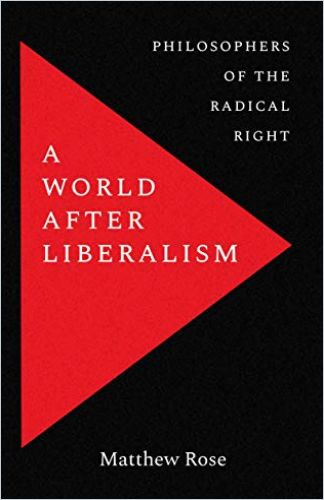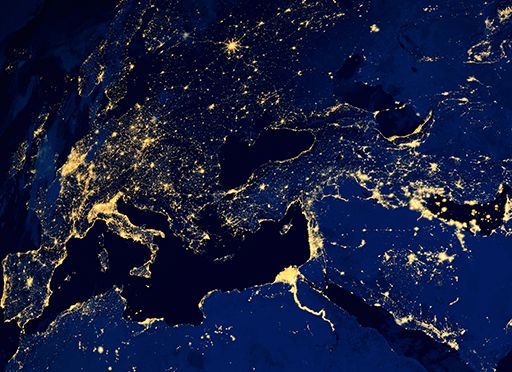Scholar Matthew Rose profiles the ideologues whose writings spawned and support today’s far-right philosophies.

Ideologues of the Alt-Right
Matthew Rose – director of the Barry Center on the University and Intellectual Life at the Morningside Institute – offers a concise but illuminating history of far-right ideology. Rose discusses the writings of five ideologues who fuel the populism and nativism of today’s post-Christian conservatism.
For decades, Western conservatism rested on the tenets of individual freedom, limited government and free trade. But in 2016, a tidal wave of dissent washed away this traditional definition of conservatism. The pushback came from the political right in Western democracies. The new right’s ideology rethinks nationalism, populism and identity politics, with many alt-right adherents openly hostile to religion.
A new conservatism, unlike any in recent memory, is coming into view.Matthew Rose
Proponents embrace a hodgepodge of ideas. Some hone in on immigration and demographic shifts; others focus on economic stagnation. Whatever their basis, Rose notes, the radical right is leading a major change in conservative thought.
Oswald Spengler
In his 1918 publication, The Decline of the West, Germany’s Oswald Spengler recounted the rise and fall of eight civilizations in Western, Classical and Arabian societies. Spengler held that no divine being directs humankind and that no universal human perspective exists.
Spengler viewed culture – language, art, music, ritual and religion – as the prism through which humans expressed themselves and experienced reality. Thus, individuals have no say in their identity; they are born into it via their native culture and cannot break free from it. Culture allows humanity to rise above animal drives and desires, and each culture is inaccessible to anyone not born into it. No fan of Hitler, Spengler argued against the “strict classification of races,” and the Nazis crushed his career. His deeply illiberal view of humanity enabled the future rise of identity politics as an ideological flashpoint.
Julius Evola
Born in Rome in 1898, Evola fought in World War I and rose to prominence as a Dadaist painter – his works remain on display in European museums. Evola’s 1934 Revolt Against the Modern World gained – and maintains – a cult following on the radical right.
Evola argued that rigid hierarchy allows humanity to thrive; every society since ancient times has built carefully defined roles for individuals. Evola was not religious, and he saw society collapsing under the political forces of materialism and equality. In 1951, the Italian government imprisoned and tried him for attempting to revive the Fascist Party, but Evola was acquitted. He envisioned a future utopia gained by rejecting democracy, liberalism and egalitarianism.
Francis Yockey
Francis Parker Yockey became a right-wing ideologue after reading Spengler’s works. In Yockey’s Imperium, he described World War II as a cultural face-off, not a military conflict, between two visions of the West’s future. Yockey argued that politics was about the West’s drive to engage in cultural domination.
Yockey had his eye on the future and his goal in Imperium was the fundamental reorientation of the American and European hard right.Matthew Rose
Profoundly anti-Semitic, Yockey argued that Marx and Freud undermined Western culture. In 1952, pursued by the FBI and the US State Department, Yockey went into hiding while outlining his philosophy of Western cultural supremacy. He re-emerged in 1960, when an airport luggage mishap led to his capture in San Francisco, where Yockey died by suicide in a jail cell.
Alain de Benoist
Born in France in 1943, Alain de Benoist won a prestigious award from the French Alliance for View From the Right, a three-volume collection of his newspaper essays and reviews. Benoist believes that liberalism cuts deep social ties, isolating individuals who must turn to the state for survival. Fractured communities split into rival groups, and societal chaos ensues.
Benoist is devoutly anti-Christian, as he demonstrated in his On Being a Pagan, and he embraces inequality as the natural order of humanity. Benoist argues that only the “European race” progresses and that all others stagnate. Benoist holds that people thrive only in the homeland of their ancestors and when speaking their language.
Samuel Francis
Born in Tennessee in 1947, Francis arrived in Washington, DC, with the election of Ronald Reagan, where he joined the Heritage Foundation and later wrote a column for the Washington Times. Francis criticized the right for being subsumed into mainstream politics.
Francis worked for conservative Patrick Buchanan’s presidential campaigns in 1992 and 1996. Since his death in 2005, Francis’s ideas have gained prominence. Journalists and scholars have turned to Francis’s writings to interpret the rise of populism, nationalism and Donald Trump.
Francis’s book Leviathan and Its Enemies was published in 2016, nearly two decades after he completed it. Leviathan argued that battles between left and right pit competing elites and their supporters against one another. He wrote that the welfare state, feminism and global trade have coalesced around the goal of creating a homogenous base of consumers and workers.
Christianity
The alt-right purports to defend beleaguered white people and rejects the mainstream right’s views on trade, social issues and foreign interventions. The alt-right dismisses organized religion as a trick that lulls white people into obedience.
The alt-right is not stupid; it is deep. Its ideas are not ridiculous; they are serious.Matthew Rose
The alt-right believes that, prior to Christianity, the natural order was clear and harsh: The strong ruled the weak and no one owed anything to a stranger. The alt-right eschews free markets and the Judeo-Christian tradition. Instead, it hearkens to a pre-Christian era by rebuilding old cultural divides and ensuring the harsh punishment of its enemies.
A Crucial Catalog
Matthew Rose condenses and highlights the writings and philosophies of these profoundly influential far rightists with a scholar’s ear for the aspects of their works that resonate most powerfully with today’s alt-right. That raises his research above a merely academic cataloging of certain viewpoints and their authors. A careful study of Rose’s text will enable readers to recognize the root sources of many of the tenets espoused by today’s alt-right. That recognition places those views in a proper historical perspective and helps readers of all political affiliations better understand the sources of current alt-right positions and how they might evolve.









